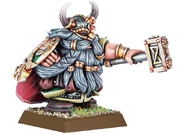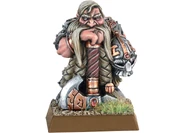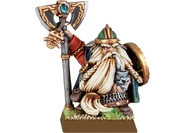"We sons of Grungni may have drunk deep from the bitter waters of misfortune, but we yet survive. Whilst a single Dwarf draws breath, we will fight the evils that assail us, and we will never, ever give up."
- —Dwarf Lord Hengist Stonebelly[2a]

A Dwarf Lord standing over the corpse of his fallen enemy.
A Dwarf Lord, who is sometimes the ruling Dwarf King of an individual Dwarf hold, is amongst the strongest and most powerful individuals within a Dwarf army, having been promoted to serve as his people's supreme commander for being a magnificent leader, an extraordinary tactician, and having one of the longest beards within the entire army.
Role
"In battle, the Dwarfen Lord gets lost in the melee with hammer in hand, strong as a dozen Dwarfen soldiers."
- —Description of a Dwarf Lord from Total War: Warhammer.[4]
These fell-handed warriors are equipped with the finest arms and armour within their clan, and have been known to fight at the forefront of their army, inspiring their comrades in the face of overwhelming odds. As a rule, Dwarf Lords are a grim sort, for they are the leaders of a dour people. Upon their broad shoulders is carried the weight of untold debt, the inherited grudges of a long-suffering and unforgiving race. It is their duty to avenge all wrongdoings to their clan, their hold, and their entire race, not just in the present, but also for all time.[1a]
Every Dwarf Lord started out as a thane, whom are the patriarchs of a Dwarf clan. For a thane to progress and become a Dwarf Lord, he must be well-tutored in the ways of their ancient foes, absorb a great wealth of wisdom, and be a bearer of royal blood. Such wisdom includes being a master of tactics and strategy, learning to wield the armoured might of their throngs of Dwarf warriors as well as they wield an axe and shield.[1a]
All Dwarfs take great pride in their possessions, but none more so than the ruling class. Not only is a Dwarf Lord a potential candidate to serve as the next king of a karak since he is a bearer of royal blood, he is also, depending upon wealth or clan, equipped with some of the mightiest runic weapons and armour available to his hold. It is an honour amongst the Dwarfs to bear such relics of war into battle, for each item is passed down from their forefathers, an ancient legacy in its own right. Covered in runes and bristling with arcane might, each of a Dwarf hold's relics have a long history of great deeds and great feats.[1a]
When a Dwarf Lord leads his throng into battle, the lord is often situated within the very centre of the army, where he is surrounded by an entire retinue of Hammerer bodyguards. It is here where the Dwarf Lord is to take command and direct his army as he would direct the blow of an axe. Should it be needed, a Dwarf Lord would personally march towards the front line and fight alongside his kinsmen, inspiring those around him with great vigour that could possibly be enough to win even the most hard-fought battles. A strong and powerful individual, a Dwarf Lord is the personification of a truly magnificent leader of the Dawi people.[1a]
Wealth

A wealthy Dwarf Lord
In a Dwarf hold, territory -- amongst other factors -- is often proportionate to status, and as his domain it is the king who has the most. Clan halls, forges, even mines are all effectively "leased" to the hold's clans and guilds by the king, and this is how the income of the royal clan is generated.[3a]
In addition to land leasing, the hold's king will also place levies upon all of the craft guilds; a request for a proportion of all gold and other precious minerals excavated from the mines to be provided to the royal coffers as well as remuneration for pickaxes, helmets and even lanterns. Dowries, too, are subject to royal duty and a king's blessing upon any union is often subject to the amount afforded (not an uncommon arrangement in the courts of Altdorf, either).[3a]
In short, the liege-lord of any hold, by the right of tradition, is entitled to tribute from any and all trade, land usage and the mining of any and all precious minerals within their hold or its surrounding owned territory. No Dwarf is free from such tolls, and there is even a tax on beards (research tells us this tax is proportionate to the beard's length but, in this case, the longer the beard the lower the tax; some particularly venerable longbeards are exempt from beard taxes all together!).[3a]
Dwarf kings prosecute all taxes with great vigour but one account, transcribed from the Karak Norn Book of Grudges in the Grey Mountains, describes a particularly greedy liege-lord, King Thagar Goldhoarder, and the implementation of a true horror -- a "beer tax." This was inevitably short-lived. Upon the announcement of the tax an industrial general strike was declared in the hold, and heavy political support was lent the way of the Brewmasters Guild by all the other Dwarf Guilds.[3a]
The "all stop" was unprecedented (there is little to no record of any other such work stoppage action in any other Dwarf history known) as Dwarf miners, brewers, masons, smiths, engineers, victualers, armourers, artisans, scribes and even goat herders all downed their tools and gathered in the great hall. There they sat in silence, unmoving, and the hold itself became ghost-like, as if emptied overnight. Neither hammers upon anvils nor pick axes against rock sounded in the deeps. Though stubborn like all his kind, after a day King Thagar became maddened by the utter quietude and finally relented, reneging on the beer tax and beseeching his kinsmen to take up their tools once more.[3a]











